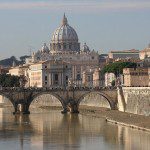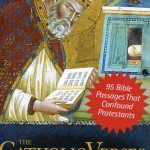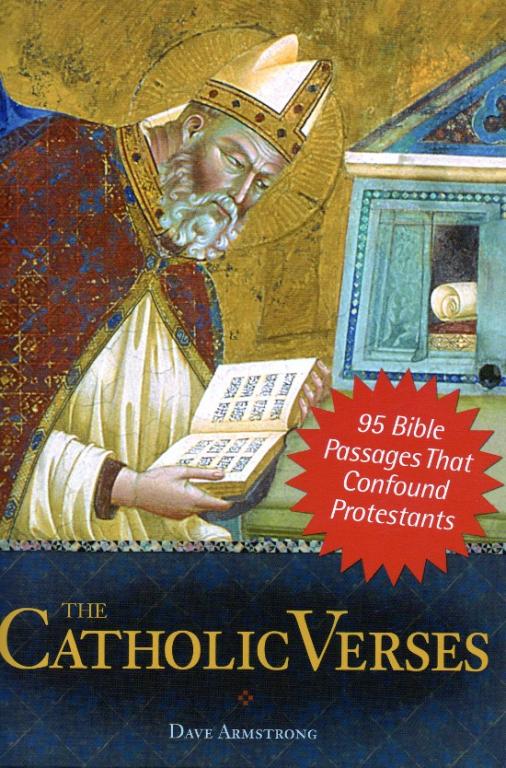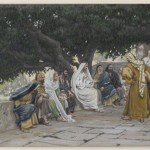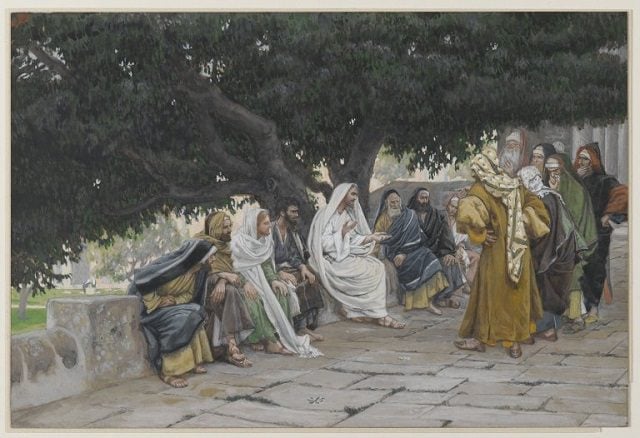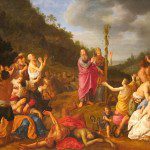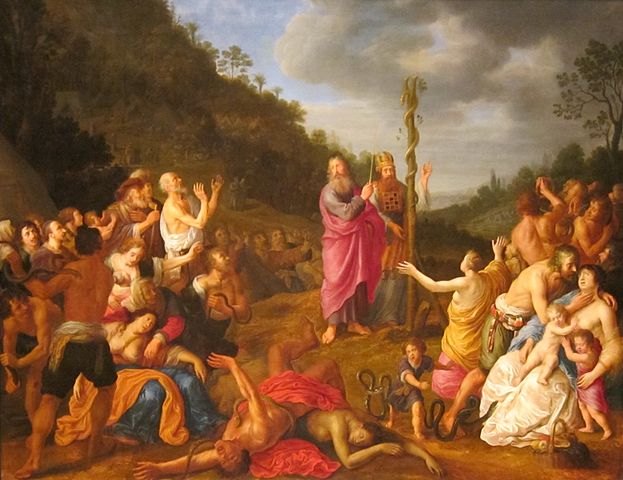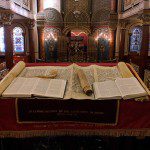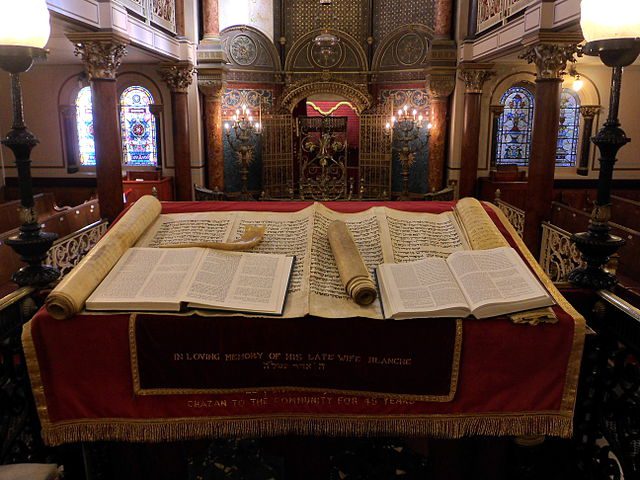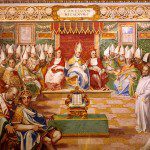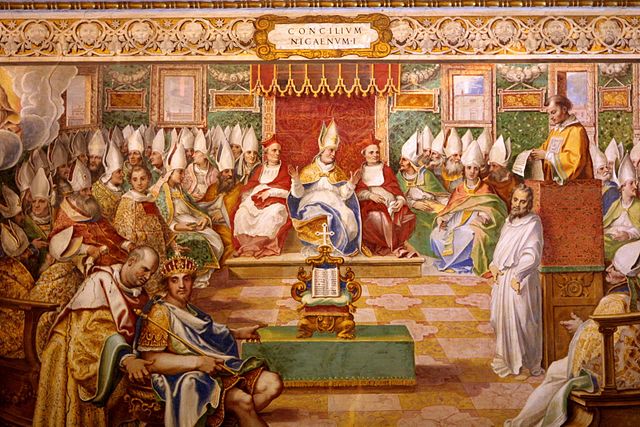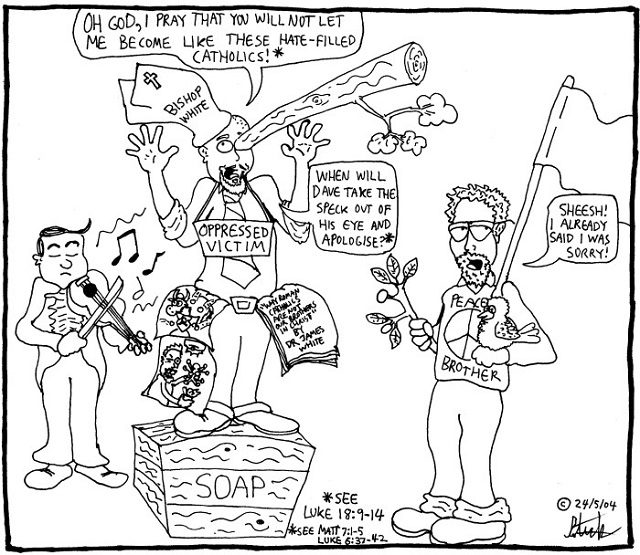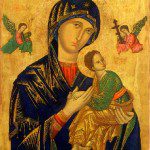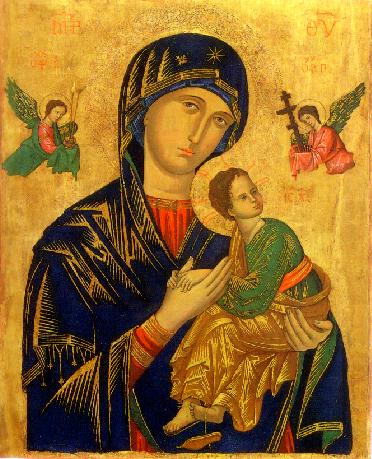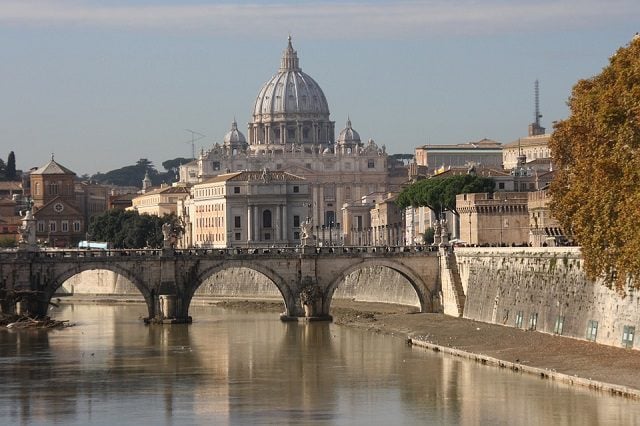
St. Peter’s Basilica and that old Tiber River that converts have to cross. Photograph by “992829” (11-21-12) [Pixabay / CC0 public domain]
***
(9-4-07)
*****
Anti-Catholic Reformed Baptist apologist James White has been having a great deal of fun with this deliberately provocative David Letterman-like (minus any trace of humor) “Top Ten list”, first introduced on his blog on 8-20-07. He has since gone on to discuss it on a webcast on 8-29-07, and in subsequent posts of 8-26-07, 9-2-07, and 9-3-07. And of course, as usual, he studiously avoided any interaction with my reply.
You can always tell when White thinks he has hit an anti-Catholic “home run” because he’ll milk the material for all it’s worth for a week or so (the previous instance of this was the controversy with Steve Ray over how many Protestant denominations exist). He also loves to pick on new Catholic converts, knowing that — in all likelihood — their newfound faith (as in all conversions, religious, political or otherwise) is still in formation and not epistemologically worked out in detail to the nth degree.
After all, not everyone is as brilliant and intellectually dazzling as Bishop White, with immediate answers to every conceivable question that might be asked of them concerning their Christian faith. Granted, millions would do well to study apologetics a great deal more than they do (and it is a part of my mission to further that goal, as it is White’s from his perspective), but on the other hand, the right reverend bishop shows himself unreasonable and irrationally demanding in what he expects of a young convert. And, by the way, if you dare to defend a recent convert from White’s personal attacks, then White may compare you to a terrorist.
This (from where he sits) was a perfect opportunity for him to exercise his bulldog-like pestering, since those who would likely respond would be those new converts to whom the post was directed. Then White (the experienced anti-Catholic apologist, with 60-70 live oral debates-worth of experience) could swoop down for the kill and whoop and yuck it up with his cronies in private about how stupid and ignorant Catholics are. Talk about a stacked deck, huh?
Of course, when dealing with a bit more experienced Catholic apologist (and convert) like myself, it is an entirely different story. In my case, for example, White has absolutely ignored many major critiques of his work, from my pen (and he may very well add the present paper to that list). He has consistently run from my arguments and refutations of his stuff for over twelve years now. He refused to engage me in a debate in his own chat room twice, [see the documentation: one / two / three / four] even after I offered him (knowing how scared he is of a “non-canned” situation) generous handicaps that gave him the advantage in terms of cross-examining time.
Oh, occasionally he will exhibit a burst of confidence, and critique one of my books or something. But that dissipates with my first reply, at which point he promptly flees for cover in the Arizona hills again (presumably on his fabled bicycle), with talk of “stalking” and “hatred” and supposed “meltdowns”, etc. Maybe all that sun has fried his brain. One looks for some sort of explanation.
For lack of any better one, I take the view that he possesses the typical bully / coward mentality: he is a bully when he knows his opponent has far less knowledge and experience than he does in apologetic matters (or exegesis, or whatever is the point at hand), and an intellectual coward with almost anyone who has more experience and challenges him to written debate (as opposed to oral). He loves the oral debate setting (and the similar set-up of his webcast) because he feels confident there, having developed scores of canned, sophistical responses through the years that have a great appearance of intellectual strength, but the depth of a sidewalk puddle.
The man has become a virtual self-parody. He can decide with this post whether he wants to grow a backbone and deal with someone who has a bit more apologetic background than many of those he loves to go after on his blog (we can only hope and wish and pray that he will do so), or else run again. I’ll document whatever happens here. If he “replies” at all, we can fully expect the usual mockery and dismissals. But there is always a chance for him to redeem himself and get some semblance of the usual confidence that intellectuals exhibit when their opinions are scrutinized. There is always a first time for anything . . .
White’s words will be in blue. Those of a convert he critiqued will be in green and the words of a near-convert (?) in purple.
Last week I received the following e-mail, and I felt it would be best to share my response here on the blog.
Dear Mr. White, For someone considering converting to Catholicism, what questions would you put to them in order to dicern [sic] whether or not they have examined their situation sufficiently? Say, a Top 10 list. Thanks.
When I posted this question in our chat channel a number of folks commented that it was in fact a great question, and we started to throw out some possible answers. Here is my “Top Ten List” in response to this fine inquiry.
10) Have you listened to both sides? That is, have you done more than read Rome Sweet Home and listen to a few emotion-tugging conversion stories? Have you actually taken the time to find sound, serious responses to Rome’s claims, those offered by writers ever since the Reformation, such as Goode, Whitaker, Salmon, and modern writers? I specifically exclude from this list anything by Jack Chick and Dave Hunt.
This is actually a decent observation, and one that I would pretty much agree with (since I am well-known for doing debates with many folks and presenting both sides on my blog so that people can see both sides presented by advocates, and make up their own minds). I do, nevertheless have a few relevant criticisms to offer:
1) White implies that if someone did this, then he would respect their decision, but we know that he does not in actual cases. For example, look at how he treats Scott Hahn (no differently from any other Catholic convert: with considerable scorn and mockery. White knows full well that Scott, a former Presbyterian pastor, voraciously read everything he could get his hands on, prior to his own conversion (literally, several hundred books). Ironically, he mocks Scott’s conversion story as lightweight (above, by strong insinuation), yet Scott did the very thing that White calls for, and it makes no difference. White will show disdain for any convert, no matter how much he studied both sides. This objection looks great as rhetoric, because it contains a significant amount of wisdom and truth, but in practice it makes no difference as far as he is concerned.
2) Many former pastors and theological professors (or former Protestant missionaries / apologists, such as myself) have converted to Catholicism. White would have to maintain that all of them were unacquainted with Protestant arguments, despite their seminary or theological educations, or (as, again, in my case) their own wide reading. This is far too simplistic, in that it would require the absurd scenario whereby any pastor / professor / missionary who becomes a Catholic must have been abominably ignorant of his own former Protestant belief-system and good reasons in favor of it.
3) Another example of the same hypocrisy is how White approaches my own case. During the course of a “critique” of my book, The Catholic Verses, he started making out that I was an ignorant Protestant who hadn’t read anything (Protestant) of any worth, and that this is why I converted (he tried to make this argument in our very first written debate, in 1995, too). Well, I took the time to list the books that I had read as a Protestant.
Now, did this make a whit of difference? Did it show White that I was sufficiently acquainted with my former Protestant belief-system, to have made a decision to become a Catholic without being accused of ignorance? No, of course not. It not only made no difference at all; White upped the ante and immediately accused me of “knowing deception” in his reply post:
Mr. Armstrong has provided a reading list on his blog. In essence, this means that instead of blaming ignorance for his very shallow misrepresentations of non-Catholic theology and exegesis, we must now assert knowing deception. So far, DA has been unable to provide even the slightest meaningful defense of his own published statements and their refutation. Which is really only marginally relevant to the real issue: hopefully, aside from demonstrating the exegetical bankruptcy of The Catholic Verses, . . . [my bolding]
This charge of dishonesty, by the way, is standard practice among anti-Catholics. Both Eric Svendsen and David T. King (good friends of White and published anti-Catholics) are on record (on Svendsen’s blog) stating that all or virtually all Catholics are deliberately dishonest deceivers. This is how opposing argument is “dealt” with.
4) This can easily be flipped around and it can be demonstrated that it is far more characteristic of former Catholics who become Protestant (especially those — many in number — who become anti-Catholic, as part and parcel of their newfound Protestantism). I’ve seen it myself a hundred times or more (when I question folks to see what they have read). One doesn’t find White chiding former Catholics for a lack of Catholic reading (if I missed it, I’d love for him to direct me to such a piece). He doesn’t urge them to get up to speed with Catholic apologetic arguments, so that they can have a sufficiently informed Protestant faith, with robust confidence. No; any argument against Rome at all is fine with White. He need know nothing further of a new Protestant convert, other than the fact that they rejected Catholic teaching in some respect. That immediately proves they are wise, regenerate, and on the side of the angels. So it is yet another double standard on his part.
5) Nor can White so flippantly dismiss the more extreme, dumb anti-Catholic polemicists, such as Jack Chick and Dave Hunt. The fact is, that most of the contra-Catholic / anti-Catholic polemical literature out there is almost as irrational and fact-challenged as the Chick garbage. Granted, folks like White and Svendsen and Webster and Hays and Turk and King and Ankerberg and MacArthur and Sproul are far more sophisticated than Chick, and generally minus the super-stupid conspiratorialism and Know-Nothing aspects of a guy like Chick, but scarcely less insulting, and with almost as many glaring fallacies and deficiencies in their work, as seen when one reads both sides with regard to one of their presentations. For every Norman Geisler, who offers an amiable, charitable, non-anti-Catholic (ecumenical), serious sustained critique of Catholicism from an evangelical Protestant perspective, there are a hundred Kings and Turks and Whites who offer misinformation and sophistry.
9) Have you read an objective history of the early church? I refer to one that would explain the great diversity of viewpoints to be found in the writings of the first centuries, and that accurately explains the controversies, struggles, successes and failures of those early believers?
White doesn’t offer an example of such an “objective history.” Of course, it would probably be a Protestant historian that he has in mind. But this is by no means the slam-dunk for his side that he supposes. For example, I have cited historian Philip Schaff many dozens of times in my treatments of the Fathers, and that is because he is a fair and accurate historian. He is thoroughly Protestant in affiliation, and makes no bones about it (often running down various Catholic beliefs in an openly partisan fashion), yet he gives the facts of history, whether they are “Catholic” or (as he sees it) more in line with later Protestantism. Thus, he is a valuable ally in my apologetic efforts of presenting the Fathers as they actually were.
I encourage anyone to read serious historical scholarship concerning the early Church, whether written by a Catholic or a Protestant. The Catholic position will always benefit from that. One could easily become a Catholic on historical grounds, simply from reading Schaff, and other learned Protestant historians such as Pelikan, Kelly, Latourette, and Oberman. One wouldn’t even have to use Catholic sources (that White would accuse of being severely slanted and biased). I would agree that many on either side of the aisle never trouble themselves to read such works, but I would direct anyone in a second to Schaff or the others I have mentioned. And that is because historical arguments from the Fathers overwhelmingly favor a more “Catholic” interpretation.
8) Have you looked carefully at the claims of Rome in a historical light, specifically, have you examined her claims regarding the “unanimous consent” of the Fathers, and all the evidence that exists that stands contrary not only to the universal claims of the Papacy but especially to the concept of Papal Infallibility? How do you explain, consistently, the history of the early church in light of modern claims made by Rome? How do you explain such things as the Pornocracy and the Babylonian Captivity of the Church without assuming the truthfulness of the very system you are embracing?
“Unanimous consent” means, of course, “significant consensus” rather than absolute unanimity. That is simply a matter of semantics. Such consensus in favor of Catholic positions is indeed what we consistently find, so this poses no problem at all. Speaking for myself, this was a central concern of mine, and I did read at least some sources that White champions, such as the Anglican anti-Catholic George Salmon, whom we see him mentioning above. And I read Catholic liberal dissidents like Hans Kung, who reject infallibility.
But then I also read (given my love for hearing both sides of any story) John Henry Cardinal Newman, and he helped me a great deal to precisely understand “the history of the early church in light of modern claims made by Rome.” But of course White wouldn’t recommend that anyone reads his works. That would be too dangerous. Newman can only be mocked, never dealt with seriously. We see this strong tendency even among contra-Catholic polemicists who are not anti-Catholic per se.
Evidence for the early existence of a strong papal authority is also abundant. I strongly urge folks to read both sides. There is also considerable biblical support for the papacy. One can find these arguments on my own Papacy Index page.
Various sins and rough periods in Church history are instances of, well, sin! This is supposed to be some surprise or disproof of anything? This is responded to by pointing out that there will always be sinners in the Church, and by showing that the supposedly pure early Protestants were no different in this regard (if not worse). We expect to find sin in any environment, even Christian places. Jesus and Paul told us it would be so, so this is no “argument” at all, and has no bearing on truth claims.
7) Have you applied the same standards to the testing of Rome’s ultimate claims of authority that Roman Catholic apologists use to attack sola scriptura?
Many Catholic apologists have dealt with anti-Catholic arguments along these lines, yes. I wouldn’t expect every new convert to be familiar with every jot and tittle of current Catholic-Protestant argumentation. It’s getting harder and harder all the time for someone to see both sides on the Internet, since very few anti-Catholic apologists lower themselves to actually engage Catholics in debate anymore. But there are more than enough of debates from the past that remain online, for folks to do the comparison themselves. I have many scores of such debates on my own blog.
How do you explain the fact that Rome’s answers to her own objections are circular?
This assumes what it is trying to prove, which is itself circular logic (strange, since it is objecting to the same thing that it is doing).
For example, if she claims you need the Church to establish an infallible canon, how does that actually answer the question, since you now have to ask how Rome comes to have this infallible knowledge.
This confuses the issue. It is indisputable that Church authority was necessary to definitively establish and verify (not create!) the canon. That is simply historical fact that no one can deny. Questions of how this authority came about are secondary to the fact. They are worthwhile in and of themselves, but merely pointing to them does not alleviate the Protestant difficulty of having to rely on a human institution for a binding decree regarding the canon (it’s a problem because for Protestants, the Bible is the only infallible authority).
This is one example (of many) of White’s unreasonable demands. The fact is, that any Christian position requires faith, for the simple reason that Christianity is not merely a philosophy, or exercise in epistemology. White’s view requires faith; so does the Catholic outlook. One exercises faith in the Catholic Church being what it claims to be: the One True Church, uniquely guided and led by the Holy Spirit, with infallible teaching. Hopefully, one can give cogent reasons for why this faith is reasonable, but it is still faith in the end: reasonable, not blind.
White’s Protestant friends have the same exact problems that need to be worked out for their systems, too. But there we have countless self-contradictions. What denomination is right? Who teaches correctly on baptism or free will or predestination? Etc. If they really agree, then why are they institutionally separate (the sin of schism)? If they disagree, then error is inevitably present somewhere, and the devil is the father of lies and falsehood, so millions of Protestants are in bondage to a pack of lies. It must be, where contradiction is present.
In any event, why does White require every Catholic convert to instantly know the answers to all these questions, lest their conversion be doubted in its knowledge, and/or sincerity? Conversion is an extraordinarily complicated and personal process. If I wanted to play this unfairly, as White does, I could easily take apart a hundred former Catholics in his chat room, if I was allowed to grill them with all of these sorts of questions (but of course they will refuse anyway, as James Swan did). I guarantee that none of them would pass with a 100% mark, under questioning of how much of both sides they have read and understood, etc. But White acts as if the validity of religious faith utterly depends on passing such a quiz and having exhaustive knowledge on these sorts of topics, that only experience, trained apologists (or clergymen or philosophers or theologians) can reasonably be expected to possess.
Or if it is argued that sola scriptura produces anarchy, why doesn’t Rome’s magisterium produce unanimity and harmony?
It does. I deny that it does not. We have one teaching, and everyone knows what it is. The fact that we are plagued by dissidents in our ranks proves nothing against our doctrine. Their very label as dissidents proves that they dissent from the official teaching. Everyone knows what the latter is. I’ve written about this, too:
Dialogue: Are Dissident “Catholics” a Disproof of the Catholic Church’s Claims of Ecclesiological and Doctrinal Unity? (vs. Eric Svendsen, James White, Andrew Webb, & Phillip Johnson)
Even White refers, in his third paper, to “wild-eyed liberal wackos who parade under the banner of ‘Roman Catholic scholarship'”. He knows the method of liberals, because they do the same thing in Protestant denominations. I agree, however, that all these issues require vigorous discussion. White and virtually all of his anti-Catholic friends don’t want to have a serious discussion of that sort. They would rather mock, run from critiques and debate challenges, and pick on new converts.
And if someone claims there are 33,000 denominations due to sola scriptura, since that outrageous number has been debunked repeatedly (see Eric Svendsen’s Upon This Slippery Rock for full documentation), have you asked them why they are so dishonest and sloppy with their research?
Speaking for myself, I agreed several years ago that this number is based in part on fallacious categorization, and I no longer use it, or anything remotely approaching it (I will usually say “hundreds of competing denominations”). White and Protestants, however, are by no means free from their severe difficulties, since (as I pointed out then, and as Steve Ray reiterated recently) any number of “churches” beyond one is a blatantly unbiblical concept.
6) Have you read the Papal Syllabus of Errors [link] and Indulgentiarum Doctrina [link]? Can anyone read the description of grace found in the latter document and pretend for even a moment that is the doctrine of grace Paul taught to the Romans?
Many new converts have not. Many longtime Catholics have not. But so what? Does White want to contend that most Calvinists have read Calvin’s complete Institutes or all of the many confessions? Many have not. Does that mean they are illegitimate Calvinists? No, and clearly so. Not everyone is required to have exhaustive knowledge of everything. I think it is sad that White makes such arguments because he perpetuates the stereotype that we apologists are burdened with: as intolerable know-it-alls. I would never say that a Catholic has to instantly know all of this stuff in minute detail before they could be accepted into the Church in good standing. White doesn’t require similar knowledge of his Calvinist friends.
The Syllabus of Errors, of course, deals with many different things. Each would require a lengthy discussion, but White is unwilling to do that. So it is hardly impressive that he simply assumes that it is a false document, with no argument.
As for Indulgences, they are based on explicit biblical (largely Pauline) evidence, that I have presented in my first book, as recently noted in a blog comment. But will White engage in that discussion? No, because he won’t discuss anything at all with me. I’m far too stupid and dishonest (so he sez) for him to lower himself to deign to interact with.
I’m all for folks knowing as much about their religious faith as the can: the more the merrier. But I would never require what White requires. He wants to set the bar so high that virtually no one would pass the test; therefore there are no legitimate Catholic converts on the face of the earth. But that is what White already believed, before he ever dreamt-up this list in the first place. So it is simply a rationalization after the fact.
5) Have you seriously considered the ramifications of Rome’s doctrine of sin, forgiveness, eternal and temporal punishments, purgatory, the treasury of merit, transubstantiation, sacramental priesthood, and indulgences? Have you seriously worked through compelling and relevant biblical texts like Ephesians 2, Romans 3-5, Galatians 1-2, Hebrews 7-10 and all of John 6, in light of Roman teaching?
This is more of the excessively unrealistic demands for a new convert. One can study theology and apologetics over a lifetime and always have more to learn. I’ve been doing apologetics for seventeen years now, and it is endless; I feel that I have only scratched the surface, and I am known as one of the more voluminous apologists.
But in any event, I could simply flip this around and find passages that are relevant to distinctive Protestant beliefs, and ask former Catholic Protestants if they had studied all of that in depth, enough to face the equivalent of a White cross-examination. God doesn’t expect everyone to know everything. He does expect a great degree of understanding of at least the basics of one’s faith, though.
In the end, all have to exercise faith. White knows this full well; in fact, the presuppositionalism (of Greg Bahnsen et al) that he himself follows, requires it. Calvin (as White also knows full well) writes about an inner subjective assurance that cannot be reduced to mere philosophy and epistemology. Calvinist presuppositionalism does not require that level of mere philosophical “certainty.” Nor does Catholicism.
White, then, is either deliberately (or not) operating on a double standard, or else he is too ignorant of Catholic apologetics to know that we do not require what he seems to feel is necessary. To read more about this strain of thought in Protestantism, see the excellent overview article (especially the sections on Calvin): The Witness of the Spirit in the Protestant Tradition, M. James Sawyer, Th.M., Ph.D. Many Catholics have expressed similar thoughts (notably, Augustine and Pascal).
4) Have you pondered what it means to embrace a system that teaches you approach the sacrifice of Christ thousands of times in your life and yet you can die impure, and, in fact, even die an enemy of God, though you came to the cross over and over again?
I replied to White regarding the Sacrifice of the Mass, but he fled, as always, and never counter-replied. We can give quite adequate answers to these objections.
And have you pondered what it means that though the historical teachings of Rome on these issues are easily identifiable, the vast majority of Roman Catholics today, including priests, bishops, and scholars, don’t believe these things anymore?
Why should anyone ponder it? It is irrelevant. Because liberals infiltrate every Christian communion and try to subvert them, has no bearing at all as to whether the teaching of that group is true. It is neither a disproof of any Protestant denomination, nor of Catholicism. White himself carps on and on about how there are hardly any real evangelicals around anymore. Yet you don’t see him advancing that fact (real or imagined) as a disproof of his own views, do you? No; that level of tomfoolery is reserved for his anti-Catholic polemics.
3) Have you considered what it means to proclaim a human being the Holy Father (that’s a divine name, used by Jesus only of His Father) and the Vicar of Christ (that’s the Holy Spirit)?
Is White serious? All one has to do here is note that there are such things as “holy men” referred to in the Bible. The writer of Hebrews calls the recipients of his epistle “holy brethren” (RSV; also the same in White’s favorite: the NASB). Peter refers to a “holy priesthood” (1 Peter 2:5; same in NASB) and “holy women” such as Sarah (1 Peter 3:5; same in NASB) and “holy prophets” (2 Peter 3:2; same in NASB; cf. Acts 3:21 [also Peter]; Zechariah’s prophecy in Luke 1:70). John the Baptist is referred to as a “righteous and holy man” in Mark 6:20 (same in NASB). Jesus refers to a “righteous man” in Matthew 10:41. Therefore, men can be called “holy” in Scripture. That solves half of this “pseudo-problem.”
Can they also be called “father”? Of course!:
Acts 7:2 And Stephen said: “Brethren and fathers, hear me. The God of glory appeared to our father Abraham, . . .”
Romans 4:12 . . . the father of the circumcised . . . our father Abraham . . .
Romans 4:16-17 . . . Abraham, for he is the father of us all, as it is written, “I have made you the father of many nations . . .” (cf. 9:10; Phil. 2:22; Jas. 2:21)
1 Corinthians 4:15 For though you have countless guides in Christ, you do not have many fathers. For I became your father in Christ Jesus through the gospel.
That solves the other half of White’s “objection.” If you can call a man “holy” and also (spiritual) “father”, then you can call a person both together, and the “problem” vanishes into thin air.
As for “Vicar of Christ” this is an equally ridiculous trifle. I don’t believe “vicar” appears in the Bible (at least it doesn’t in the KJV and RSV, that I searched), yet somehow Bishop White has this notion that this phrase can only denote the Holy Spirit. Where does he come up with this claptrap? Here is the definition from Merriam-Webster online:
- Main Entry:
- vic·ar
- Pronunciation:
- \ˈvi-kər\
- Function:
- noun
- Etymology:
- Middle English, from Anglo-French, from Latin vicarius, from vicarius vicarious
- Date:
- 14th century
1: one serving as a substitute or agent; specifically : an administrative deputy
Now, is this some blasphemous way of speaking about disciples of Jesus? Again, absolutely not, for it is the sort of language (substitutes, agents, ambassadors, etc.) that Jesus Himself used, in referring to His disciples (the word disciple itself is not far in meaning from vicar):
Matthew 10:40 He who receives you receives me, and he who receives me receives him who sent me.
Matthew 16:19 I will give you the keys of the kingdom of heaven, and whatever you bind on earth shall be bound in heaven, and whatever you loose on earth shall be loosed in heaven.Matthew 18:18 . . . Whatever you bind on earth shall be bound in heaven, and whatever you loose on earth shall be loosed in heaven.
John 13:20 Truly, truly, I say to you, he who receives any one whom I send receives me; and he who receives me receives him who sent me.
John 20:23 If you forgive the sins of any, they are forgiven; if you retain the sins of any, they are retained.
Jesus even goes further than that, extending this representation of Himself to children and virtually any human being:
Matthew 18:5 Whoever receives one such child in my name receives me.
Matthew 25:40 Truly, I say to you, as you did it to one of the least of these my brethren, you did it to me. (cf. 25:45)
Mark 9:37 Whoever receives one such child in my name receives me; and whoever receives me, receives not me but him who sent me.
Luke 9:48 Whoever receives this child in my name receives me, and whoever receives me receives him who sent me; for he who is least among you all is the one who is great.
Then we see instances of radical identification with Jesus, such as the term “Body of Christ” for the Church, or Paul partaking in Christ’s afflictions (Col 2:8; cf. 2 Cor 1:5-7, 4:10, 11:23-30; Gal 6:17), or our “suffering with Christ” (Rom 8:17; 1 Cor 15:31; 2 Cor 6:9; Gal 2:20; Phil 3:10; 1 Pet 4:1,13)
Where’s the beef, then? Jesus routinely refers to something highly akin to “vicar” in these statements (and the Apostle Paul picks up on the motif in a big way). So the pope represents Christ to the world, in a particularly visible, compelling fashion. Big wow. This is not outrageous blasphemy; it is straightforward biblical usage. Who is being more ‘biblical” now?
Do you really find anything in Scripture whatsoever that would lead you to believe it was Christ’s will that a bishop in a city hundreds of miles away in Rome would not only be the head of His church but would be treated as a king upon earth, bowed down to and treated the way the Roman Pontiff is treated?
I see plenty about Petrine and papal primacy and headship; yes (see my Papacy page). Would White like to actually have a discussion about it, rather than taunting new converts?
2) Have you considered how completely unbiblical and a-historical is the entire complex of doctrines and dogmas related to Mary? Do you seriously believe the Apostles taught that Mary was immaculately conceived,
No, because that was a development of the notion of her sinlessness that came to fruition hundreds of years later, just as the canon of Scripture was a development that came to fruition hundreds of years later, and just as the Two Natures of Christ was a development that came to fruition hundreds of years later. Whoop-de doo! The disciples would have understood that she was sinless, as seen in Luke 1:28, closely examined.
and that she was a perpetual virgin (so that she traveled about Palestine with a group of young men who were not her sons, but were Jesus’ cousins, or half-brothers (children of a previous marriage of Joseph), or the like?
There are plenty of biblical and historical arguments for that (see the appropriate section on my Mary Page). Luther, Calvin, and Zwingli, and many many Protestants through history (such as John Wesley) were as stupid as Catholics, since they, too, firmly believed in this doctrine.
Do you really believe that dogmas defined nearly 2,000 years after the birth of Christ represent the actual teachings of the Apostles?
Development is not creation. Creation of doctrines ex nihilo can only be seen in such Protestant novelties / corruptions as sola Scriptura and sola fide and denominationalism, that cannot be traced to the Fathers at all.
Are you aware that such doctrines as perpetual virginity and bodily assumption have their origin in gnosticism, not Christianity,
No. If White wishes to call biblical evidences Gnosticism, he may do so. I don’t think he will impress many people with such an argument, though.
and have no foundation in apostolic doctrine or practice?
Really? That’s news to me.
How do you explain how it is you must believe these things de fide, by faith, when generations of Christians lived and died without ever even having heard of such things?
Biblical and historical arguments, and consideration of development of doctrine more than amply explains it.
And the number 1 question I would ask of such a person is: if you claim to have once embraced the gospel of grace, whereby you confessed that your sole standing before a thrice-holy God was the seamless garment of the imputed righteousness of Christ, so that you claimed no merit of your own, no mixture of other merit with the perfect righteousness of Christ, but that you stood full and complete in Him and in Him alone, at true peace with God because there is no place in the universe safer from the wrath of God than in Christ, upon what possible grounds could you come to embrace a system that at its very heart denies you the peace that is found in a perfect Savior who accomplishes the Father’s will and a Spirit who cannot fail but to bring that work to fruition in the life of God’s elect? Do you really believe that the endless cycle of sacramental forgiveness to which you will now commit yourself can provide you the peace that the perfect righteousness of Christ can not?
By denying the false assumptions and categorizations present in this hyper-loaded question. Catholics accept sola gratia every bit as much as Protestants do, so it is a non-issue. We deny (solely) imputed justification, but that is distinct from sola gratia. White’s disdain of sacramentalism puts him at odds, of course, with the vast majority of Protestants throughout history, let alone Orthodox and Catholics. I have shown that by using his criteria of “sacramentalism vs. grace” Martin Luther himself could not even be regarded as a Christian; nor could St. Augustine (and White loves him even more than Martin Luther).
White has far more insuperable problems to resolve than any Catholic convert has. I’ve highlighted many of them, but they are by no means a complete list. In White’s worldview consistently applied, virtually no one can be a regenerate Christian at all except for Calvinists.
I have often pointed to the highly emotional nature of the vast majority of conversion stories to Rome, and have discussed the fact that conversions, per se, do not surprise me in the last.
Some of course, are “highly emotional” just as we find in Catholic-to-Protestant conversions. I would hope that a change of mind and heart in such important matters would be emotional and not unemotional. But I see infinitely more rational analysis of conversion put forth by Catholic converts, than the other way around. Fair-minded Protestant observers such as Mark Noll have noted this as well.
The less biblically sound and grounded post-evangelicalism becomes, the more common such movement in the various religions of men will be.
Well, that is a convenient little theory, isn’t it? The only problem is that it doesn’t fit well with the facts. Most important converts who become known, come from the healthy and vigorous and traditionally orthodox places of Protestantism, not the compromised sectors. That’s why White rarely gives any solid examples. He has gone after Francis Beckwith, trying to prove that he never was an evangelical, but that is too absurd to even waste time refuting.
White then starts citing a recent convert, responding to his #10 (seen above):
This just seems so insulting. Mr White has interacted with so many converts. I doubt he really listens to any of them. I wrestled with these questions for years. I did seek out debates. It was hard to from many of the protestants I respect the most because they either ignore the questions altogether or they give a shallow response that has been refuted many times. The ones I did find were just not convincing. James White is one of the few that has frequently debated Catholics. I was frustrated by him because his skill was in ducking the questions and not answering them. He would sound good but when you reflect on what he said you realized he didnt really answer the difficulty. He just smoothly the rhetorical pin. [sic]
This is exactly right, and reflects my experience and that of many other converts.
Notice how the very first response bristles with emotion. The convert is intent upon taking everything personally, looking to be offended, so as to avoid, it seems to me, the actual force of the questions themselves.
Yes, it has emotion, because he is disgusted (as many of us are) with the low quality of anti-Catholic responses to our concerns. Emotion and passion about religious matters is a great thing. It shows fire and life. It’s exactly the way God wants us to be. Jesus wept and overturned the tables of the moneychangers. Paul lost his temper and made sarcastic comments about people castrating themselves, etc. He was passionate about Jesus. So should all Christians be. Why, then, does White mock this?
I don’t see anything “personal” in this reply. But I see a lot of true analysis of White’s and other anti-Catholics’ pathetic modus operandi. I know from firsthand experience, I could literally write a book about all the mocking and personal insults I have endured from this crowd myself. No one is more merely “emotional” (and irrational) than they are, especially when mocking converts or Catholicism in general.
White demanded that converts listen to both sides. This person has done so. Why can’t White accept that? Instead, he passes right over that relevant factor and pretends that it is only emotionalism with no content. This is classic — absolutely classic — White sophistry, that he utilizes constantly.
Now, in essence, the response here is “I couldn’t find any decent answers.” I’m sorry, but that is really hard to believe.
Not at all; not in the sense that he describes: people grappling with the best of Catholic apologetics that can be brought to bear. He was truly trying to see solid discussion, but anti-Catholics hardly do any of that anymore. They have thrown in the towel en masse. It’s fairly striking. Again, anyone can observe this in how White treats any of my examinations of his arguments (almost certainly including this very paper). A true seeker or inquirer would want to see how one side answers the tough questions of the other. Anti-Catholic persistently refuse to do that, but you can always find a Catholic apologist facing these questions head on.
But anyone who can simply dismiss a Whitaker or a Goode or a Salmon as “shallow” is not really engaging the subject meaningfully.
Right. I would certainly dismiss Salmon as shallow. Why is this impermissible? White characterizes any defense of Catholicism (e.g., Newman) as shallow and worthless. Why is it inconceivable to him that some of his champions may be perceived in the same way?
And as to the accusation against me, once again, as we had with Guardian’s rhetoric which required him to request 90 days to come up with some substantiation to his allegations, we are given the accusation, but no examples.
I’m providing quite a bit right now, in examining how White operates. My friend Paul Hoffer is preparing, as I sit here, a very extensive analysis of White’s sophistry, with many examples (after White challenged him to do so). Stay tuned! I have dozens of papers where one can see White’s usual method (or “anti-method” as it were).
I post videos of the cross-examinations we do right here on the blog. If I was “dodging” questions all the time, why would I do that?
If he didn’t dodge hard questions, why in the world would he turn down a live chat debate with me in his own chat room, where I offered him an opportunity to do nothing but cross-examination? Because I am an idiot and an ignoramus, is his response. Okay; let us assume that this is true: I’m dumber than a box of nails or the Rock of Gibraltar. All the more reason for White to prove this to the world in such an encounter. The Golden Opportunity. But White has so much to lose he wouldn’t dare take me up on it.
But if it is actually my opponents doing the dodging, well, that changes the picture. So without examples, we only have the one side, which makes the debates available for all, and the other side’s unsubstantiated accusations.
One can observe a twelve-year history of White’s unsavory and cowardly tactics, just in his interaction with myself alone. I have it documented. Some of the worst stuff I actually removed from my blog, however, out of charity to Bishop White. But I could easily find it on Internet Archive, if pressed.
And here is a bit of White’s latest round:
I really wasn’t interested in it enough to visit his site, since I was pretty confident it would be nothing more than one of his typical attacks on Catholicism.
Indeed, it is that; I concur. Lots of scattershot attempts and sophistry, with an accompanying unwillingness to discuss any of the particulars (with an apologist like myself) in the depth that any given particular deserves and demands.
Of course, no one has ever claimed that impeccability is required. But anyone who has read about the history of the Papacy knows there is a difference between impeccability and basic, simple regeneration.
White doesn’t think any Catholic who believes all that his Church teaches, is regenerate. So any additional sin that could be brought to bear is quite beside the point. Likewise, with the papacy. Pope St. John Paul II was a very holy man. Did that make any difference in how White and his holier-than-thou cronies treated him after he died? No, not at all.
And for a lengthy period, the Papacy was held by men the lost world itself considered reprobates. Evidently, when it comes to the Papacy, no amount of immoral behavior, false teaching, or general improper behavior, is sufficient to overthrow the ever-strong desire for a king.
Most of the kings of Judah and Israel were wicked, too. Yet Jesus Himself was descended through one such (relatively righteous) king: David. Even he was a murderer and adulterer. But the pope is not a king. He is a shepherd and fisher of men.
So, the realistic factionalism of Rome would prove the magisterium insufficient, yes?
No, not at all. Not any more than the presence of Judas among the twelve disciples rendered the rest of the disciples “insufficient” or illegitimate. If Catholic liberals “prove” that no one can know what Catholics believe and/or that the Magisterium has no authority, then by the same token, Protestant liberals “prove” that any given Protestant denomination has no confession or creed or governing body that has any authority. It proves too much and rebounds against White’s own position, and so it is a lousy argument and must be discarded. The existence of liberals proves absolutely nothing more than that there are such things as liberals, who try to subvert received traditions and the Bible itself.
Incidentally, and speaking of essentials, I believe Calvin would say that Mr. White’s Reformed Baptists are not part of the true church, since they do not properly attend to the Sacraments.
I haven’t any idea why this shot was included, but while that would have been true (does he think I am unaware of this?), what does it have to do with anything?
It has a great deal to do with the incoherence of a position of one person, who is illegitimately, illogically assailing the supposed incoherence of another view. It’s a sort of “throwing stones in a glass house” scenario. Isn’t it fascinating, though, that Calvin would read White out of the Church (and that White freely acknowledges this)? Martin Luther would definitely do the same (with much more vehemence and passion). Yet White wants to go around claiming his way is the Right Way, and that his understanding is superior to the very founders of Protestantism. Why should anyone believe his take on things (or Luther’s or Calvin’s, for that matter)? Protestantism is a bucket with a thousand holes in it.
I hold Calvin to the same standard I hold anyone else to–the very standard he would have had me use,
That’s fine and dandy, but how are we out here reading both Calvin and White, to determine who is right, when there is contradiction? That has always been one of many insuperable difficulties of Protestantism.
if he could be allowed to be consistent given his historical situation.
Now we have historical relativism. Fascinating . . . let Calvin be born a hundred years later and he would have attained consistency. What a joke . . .
I was referring to bishops and theologians and the very people who teach the faithful, priests, all across the world today. Any person who closes their eyes to the rampant inclusivism and universalism in Rome today is simply engaging in self-deception.
Prove it in magisterial documents . . .
. . . everyone knows that when the Pope is called “Holy Father” it is done in a religious context of veneration; it is joined with such terms as “Vicar of Christ on earth.” Language has meaning; adding multiple terms together has meaning. There is no comparison, obviously, between Stephen’s references to the fathers of the Jews (i.e., the patriarchs) and the religious veneration and obeisance offered to the bishop of Rome.
The pope is held in very high esteem just as the persons who were described as “holy” and “[spiritual] father” in the Bible were held. So what? Much ado about nothing . . .
I would not have slept with the woman who carried the Christ in her womb if I were Joseph.
An amazingly absurd thing for someone to say who pretends to honor marriage, to be sure. More of Rome’s anti-marriage bias seeping into even the one who is still wading in the Tiber, perhaps?
This “answer” is its own refutation. Any further comment would be entirely superfluous.
Calvin and Luther believed this doctrine [perpetual virginity of Mary]. Anyway, this litany of doubt raises only secondary issues to the primary issue of church authority.
Calvin showed next to no interest in the subject, and, had he lived today with the data available now, and with Rome’s further exaggerations in the past, you can bet he would have been just as politically incorrect in denouncing such myths as I am. Probably more so.
Right. So now White engages in historical anachronism forward as well as backward. He would win over Calvin himself on all disputed points, could they but live in the same time period. Yet he can’t persuade his Presbyterian friends today (folks like David T. King) to become good Baptists.
In his installment of 9-2-07, White entertains us with the following hyper-ridiculous, ultra-circular conclusion:
Will it be a difficult day when our convert discovers that the Protestantized version of Rome’s gospel he has accepted is inconsistent with that taught by Rome over the years? Or will that ever happen, in light of an ever less doctrinally oriented Roman Catholicism in the West, one enamored with inclusivism and even universalism? Or will this convert do what so many others have done and adopt a “cafeteria style” Catholicism that picks and chooses what will be believed and what will not? It is hard to say, but the saddest thing is that the essence of the last question clearly went right past our convert, which would indicate significantly less than enough reading and study in both his former beliefs (whatever they might have been) and Rome’s soteriology as well. Which, I think, was why I wrote the questions I did in answer to the e-mail. Of course, it is an act of God’s grace that would ever allow a person to realize the importance of the question, let alone what it means to him or her.
Wow. Well, folks, you can see how so much of apologetics in response to anti-Catholics involves a reinventing of the wheel. One tires of going over the same old ground again and again. But in any event, I’ve done some of that today, and hopefully it will be of some use to those who are harmed by White’s sophistical polemics.


